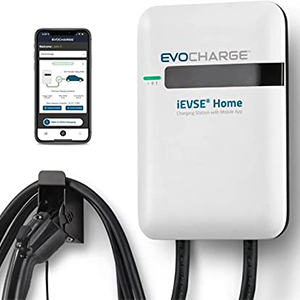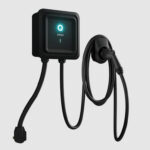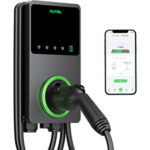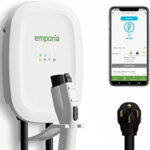State of Charge
Charging Station Reviews
We independently review every item we recommend. If you buy through our links, we may earn a small commission that helps us continue to make quality content for you. Thanks for your support!
EvoCharge EV Charging Station Review
It’s sleek, compact, and comes with multiple power levels, but does it meet my standards?
Table of Contents:
EvoCharge EV chargers are pretty new to the EV charging scene, only having been around for a year or so, but that hasn’t stopped them from rocketing to stardom on Amazon. With such an impressive buzz surrounding their products, I knew it was time to get my hands on a few units so I could put them through their paces.
At the moment, EvoCharge offers three residential models on top of their commercial products, so I made sure to obtain all of them to analyze and review. It has one 32-amp non-smart charger called the EvoCharge EVSE 32, which can come with an 18-foot or 25-foot cable. It also has two smart options: the EvoCharge iEVSE 32, a 32-amp charger with either an 18-foot or 25-foot cable, and the EvoCharge iEVSE 40, a 40-amp charger that comes with a 25-foot cable.
Visually, there’s not a lot of difference between them, with their NEMA-4 housings and digital displays. But despite those similarities, I still planned to test each one with the same attention to detail that I do all of my EVSEs.
Key Specs of the EvoCharge
The EvoCharge EVSE and iEVSE Home are plug-in EV charging stations that come standard with a NEMA 6-50 plug, but they can also be hardwired if you choose. The compact unit also arrives with the charging cable and its J1772 connector, a mounting bracket, the connection holster, four screws, and three wire lug rings if you decide to hardwire it. The power cable itself is only about 10 inches long, so if you're using it as a plug-in unit, the outlet will probably have to be installed ground down and close by to accommodate the plug.
You shouldn't have a lot of difficulty in installing the EvoCharge. Just unscrew the screw holding the mounting bracket to the back of the unit and slide it off, then mount it to the spot of your choice using the pre-drilled holes. My recommendation will always be to do this over a stud– chargers can accidentally get ripped off the wall, and you don't want that to happen if you can avoid it! Screw your mounting bracket into place, slide the unit on top, snap it into position, and retighten that first screw to finish it up.
If hardwiring is more your style, then the EvoCharge can be installed that way, too. This installation method is generally safer since it reduces the chance of the EVSE causing an electrical failure. But don't be tempted to make this another DIY project– the safest option for the home installation of a hardwired EV charging station is to hire a licensed and bonded electrician. There are a lot of choices out there, but I personally recommend my channel sponsor Qmerit for the job. With their skill and expertise, you can count on them to do the job right the first time, in the safest way possible.
Once the unit is on the wall and powered up, it's time to install your remote connector holster. The EvoCharge has a pretty unique setup here: it's a two-piece connector holster that swivels, with a solid metal base and a swiveling plastic insert that actually slides out so you can mount the base on the wall. Don't be tempted to install this right next to your charger! One good thing about these types of holsters is that you can mount them practically anywhere, so make sure you put yours in a convenient spot near your EV charge port. The EvoCharge comes with the screws you'll need to mount it in place.
Depending on your chosen model, the EvoCharge can deliver up to 7.7 kilowatts with the 32-amp version or 9.6 kilowatts with the 40-amp version from a 240v outlet. According to the manufacturer, you can add up to 30 miles of range per hour, depending on your EV's efficiency. The unit has a digital display that shows the current number of kilowatt-hours delivered over time, but it doesn't show the current power delivery in kilowatts, which seems like a miss to me.
Both the smart and not-smart 32-amp versions come with 18-foot (5.5 meters) and 25-foot (7.6 meters) cable options, while the 40-amp version only comes with a 25-foot cable. With its J1772 connector, these units can charge any North American EV, and its NEMA-4 enclosure is proven to protect the EVSE from inclement weather, making it a great choice for both indoor and outdoor use. But while the EvoCharge is UL-listed, its Energy Star certification is still pending.
The 32-amp and 40-amp versions of the EvoCharge iEVSE Home are Wi-Fi-connected smart chargers that can connect your charger to the EvoCharge mobile app and web portal. All you need to do is create an account with EvoCharge and pair the device with your home Wi-Fi network, and you should be good to go. The app allows you to start and stop charging sessions, view real-time energy delivery and energy reports, and even set up a charging schedule to take advantage of off-peak rates. You cannot, however, adjust the power amperage through the app like you can on some charging stations: that needs to be done with dip switches inside the unit.
It's worth mentioning that I did find it a little confusing when I got a pop-up after I finished configuring the app that asked if I wanted to enable "Plug and Charge"– that's a phrase usually used for public charging stations that automatically authenticate and bill your account after you plug your EV in. EvoCharge uses the phrase to ask if you want to start charging as soon as you plug in your EV or if you're going to set a delayed charging schedule, though. It's a little odd that they'd appropriate a term already in use in the EV charging community.
Testing
Probably one of the most interesting (and fun) parts of my job is putting all this new technology through a series of tests to simulate wear and tear out in the wild. Buying a new EV charging station isn't cheap, and savvy consumers want to know how well something works before they pull out their wallets to make the investment. Even with three EvoCharge EVSEs to test this time around, I still made sure to investigate how each of them performed under extreme conditions.
The Connector Drop Test
Dropping charging connectors is just a part of life. I check how a connector will react after a few falls to showcase how well a particular device is built, namely by dropping it to a concrete floor about five times from chest height. The connector for the EvoCharge iEVSE Home 40-amp didn't have any issues with this test, but the 32-amp EvoCharge EVSE's connector ended up showing a handful of good scuffs while the plastic on the top corner cracked. It would still be functional, but I wouldn't say I liked seeing it come away with damage and docked the score accordingly.
The Cable Deep Freeze Test
If you live in a northern state or mount your charging stations outside, then you know how important it can be that your charging cable holds up well in the extreme cold. To simulate such conditions, I put the EvoCharge into a commercial ice cream freezer for 24 hours. The temperature inside measured at -15.5° F (-26.3° C) when I finally pulled the unit out and tried unwinding the cord. Since thinner cables usually prove to be more flexible and the EvoCharge's cable measured at 16 millimeters, I felt it had a decent chance of walking away with a good score. Unfortunately, that didn't turn out to be the case this time. The frozen cable remained coiled up like a spring and was so stiff that I actually pulled the unit off the wall. I can't recommend the EvoCharge for cold-weather EV charging. If you need an EVSE that will perform well even in the frostiest conditions, you'd be better off looking at a home charging station like the ChargePoint Home Flex, whose cable remained almost as flexible right out of the freezer as it was when it went in.
The Automatic Restart Test
The Automatic Restart Test is one of my newer tests on State of Charge, where I plug my EV in to make sure it starts charging, shut the circuit breaker off to simulate a power outage, then turn the circuit breaker back on and make sure that charging resumes. Many newer EVSEs have an automatic restart feature, so it's essential to test how well it works; that way you don't wake up after a power outage to find yourself with a battery that never charged. I used my Ford F-150 Lightning for this test. The EvoCharge did take a minute or two to re-initialize and start charging again, but it worked. That earned it a passing grade this time around.
Because some things just can't be quantified on the ChargerRater, I also like to give my own personal rating, too. The 40-amp EvoCharge iEVSE Home earned 4.75 stars out of 5 in my book; I really liked the compact design and the NEMA-4 enclosure, and I believe that with some tweaks here and there, it could be a really good unit. After combining my score with that of the ChargerRater and averaging them together, I gave the 40-amp EvoCharge iEVSE Home a final score of 4.5 stars out of 5. EvoCharge has entered the market with a variety of offerings, from power, connectivity, and cable length, and hopefully, they'll only continue to improve.
The 32-amp non-smart EvoCharge EVSE sells for $568.00 on Amazon with an 18-foot cable, while the smart EvoCharge iEVSE Home can be purchased on EvoCharge's website for $699.00 (as of April 1, 2024). Don't forget to check out my full review in the video above, and let me know your thoughts in the comments below.

By: Tom Moloughney
YOU MIGHT ALSO BE INTERESTED IN:


EVChargingStation’s Comment Policy
We welcome polite, respectful comments, but rudeness and personal attacks will not be tolerated. All comments are reviewed prior to publication. Thanks for joining in the conversation!









0 Comments